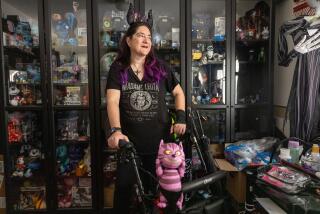Disney is sued over new ride access policy for disabled
Families of children with disabilities have sued Walt Disney Co. theme parks and resorts in Anaheim and Orlando, Fla., over a new policy allowing guests with disabilities quick access to rides and attractions.
The suit, filed last week in U.S. District Court for the Central District of California, alleges that the policy put in place in October is intended to discourage guests with disabilities from visiting the parks. Disney dismissed those claims.
Before October, visitors with disabilities and their family members were given a card that allowed them to go directly onto rides, skipping long lines. Under the new policy, the guests get a card that lets them return at a scheduled time to get on a attraction faster.
The policy change came about partly in response to reports that guests at Walt Disney World in Orlando were hiring disabled people to accompany them into the park to skip the lines.
But the lawsuit, filed by Tampa-based Dogali Law Group, says the new policy makes it so difficult for guests with disabilities, especially autistic children, to get on a ride that it discourages them from visiting the theme parks.
The suit says guests have to wait in line to be photographed for a “Disability Access Service” card under the new policy. And even when they return to an attraction at a scheduled time, the new policy does not guarantee that guests with disabilities can get on the attraction immediately, the suit says.
The lawsuit suggests that Disney might have adopted the new policy to discourage families of autistic children from visiting the park because they may disrupt the “magical Disney experience enjoyed by Disney’s nondisabled guests.
In a statement, Disney rejected the claims in the lawsuit.
“Disney Parks have an unwavering commitment to providing an inclusive and accessible environment for all our guests.” The company said it complies fully with the federal Americans With Disabilities Act.
More to Read
Inside the business of entertainment
The Wide Shot brings you news, analysis and insights on everything from streaming wars to production — and what it all means for the future.
You may occasionally receive promotional content from the Los Angeles Times.










